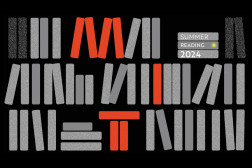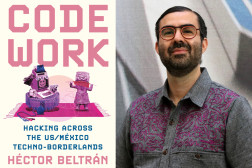Biography
Héctor Beltrán is a sociocultural anthropologist who draws upon his interdisciplinary background to study how the technical aspects of computing inform and are shaped by social structures and lived experiences of identity, race, ethnicity, class, and nation.
In researching the information technology economy, forms of hacking, and the future of digital work, he uses ethnographic methods to investigate how people use technology to resolve problems, both within their everyday milieus as well as in such circumstances as transnational collaboration. Beltrán completed his PhD in Anthropology (2018) and MA in Folklore (2012) at UC Berkeley and holds a BS in Computer Science and Engineering from MIT (Course 6-3 2007). Before coming to MIT, he was a UC President’s Postdoctoral Fellow at UC Irvine. Beltrán’s first book, Code Work: Hacking Across the US/México Techno-Borderlands (Princeton, 2023), examines how Mexican and Latinx coders navigate a transnational economy of tech work and, in the process, develop a strong sense of their personal and political selves. The ethnographic research and writing for this project has been funded by the School for Advanced Research, The Wenner-Gren Foundation for Anthropological Research, American Council of Learned Societies, Social Science Research Council, Ford Foundation, UC-Mexus, and UC Berkeley Institute for the Study of Societal Issues. Beltrán is currently also working on an anthropological history of the intertwining development of computer science and hacking in modern México. His second book project is a discursive and ethnographic analysis of the contemporary global phenomenon of the “digital nomad.” At MIT, he teaches classes on subjects such as: the cultural dimensions of computing; practices of hacking from the Global South; and Latinx and Latin American identities, politics, and social movements.
Research
My first book, Code Work: Hacking Across the US/México Techno-Borderlands (Princeton, 2023), chronicles a tension between the transformative promise of hacking—the idea that coding will reconfigure the boundaries of race, ethnicity, class, and gender in liberatory ways—and the constrained reality of a neoliberal capitalist economy divided and structured by the US-Mexico border. Revealingly, Mexican and Latinx hackers apply concepts from the code worlds of software engineering to make sense of their lived experiences, using the language of batches, loose coupling, iterative processing (looping), hacking, prototyping, and full-stack software development in their daily social interactions—at home, in the workplace, on the dating scene—and in their understandings of economy, culture, and geopolitics. Merging ethnographic analysis with systems thinking, I draw on eight years of research in Mexico and the United States—during which I participated in and observed hackathons, programming workshops, and tech entrepreneurship conferences—to argue that coders who participate in a tech economy that stretches from villages in rural Mexico to Silicon Valley use analogic thinking to “think with the code” and to inspect the iterative processes of exploitation and co-optation characteristic of global market forces as well as of Mexican statecraft.
As part of a MISTI-funded project titled “History of Computing from Mexico,” I am collaborating with colleagues in México on a wide-ranging historical study of Mexican cultures of computing. Combining archival research and oral historiography, we are surfacing the developers and users behind early computing platforms, highlighting their contributions to the field of computer science. We trace how research agendas and cultural practices have changed over the last 60 years, as university programs strive to keep curricula up-to-date with the latest computing infrastructures while also inculcating an unofficial hacking ethos among students. By re-focusing on the people behind these often invisibilized cultures of computing, we connect the history of machines with culturally specific visions of identity, class, gender, and nation.
My second book project is a discursive and ethnographic analysis of the contemporary global phenomenon of the “digital nomad,” as it plays out across key geographic sites. The discursive part of my analysis maps the contours of globally circulating narratives aimed at attracting remote digital workers to specific locations. The empirical part of the research makes ethnographic deep-dives into country-specific locations to learn how shifting narratives, local employment laws, available technical infrastructures, and social engines of differentiation are established within particular political economic contexts.
Selected Publications
| 2024 | “The Ethno-Stack.” In The SAGE Handbook of Global Sociology. Gurminder K. Bhambra, Lucy Mayblin, Kathryn Medien, and Mara Viveros-Vigoya, eds., pp. 455-465. |
| 2023 | Code Work: Hacking Across the US/México Techno-Borderlands. Princeton: Princeton University Press. |
| 2022 | “Hacking, Computing Expertise, and Difference." in Just Tech. Social Science Research Council. March 1, 2022. |
| 2022 | “In the Mood for Love (In and Out of the Code Worlds)." Parables of AI in/from the Majority World, Singh, Ranjit, Rigoberto Lara Guzmán, and Patrick Davison, eds., pp. 81-87. New York: Data & Society Research Institute. |
| 2021 | “Cybraceros: The Promise and Perils of Border Hacking.” Hack_Curio, September 7, 2021. |
| 2021 | “Cybraceros: La promesa y los peligros del border hacking.” Hack_Curio, September 7, 2021. |
| 2020 | “Code Work: Thinking with the System in México.” American Anthropologist 122(3): pp. 487-500. |
| 2020 | “The First Latina Hackathon: Re-coding Infrastructures from México." Catalyst: Feminism, Theory, and Technoscience 6(2). |
Teaching
21A.133
Latin American Migrations
Examines economic, cultural, political, and social dimensions of past and present migrations from Latin America and the Hispanic Caribbean to, from, and within the United States. Explores Latina/o community dynamics, politics of migrant labor, relational formations of race, and transnational forms of belonging. Students analyze ethnographies, films, visual arts, journalism, and music to study migration using central analytic concepts from anthropology, sociology, ethnic studies, and Latinx studies.
21A.500J/STS.075J
Technology and Culture
Examines the intersections of technology, culture, and politics in a variety of social and historical settings ranging from 19th-century factories to 21st-century techno dance floors, from Victorian London to anything-goes Las Vegas. Discussions and readings organized around three questions: what cultural effects and risks follow from treating biology as technology; how computers have changed the way we think about ourselves and others; and how politics are built into our infrastructures. Explores the forces behind technological and cultural change; how technological and cutural artifacts are understood and used by different communities; and whether, in what ways, and for whom technology has produced a better world.
21A.504J / STS.086J / WGS.276J
Cultures of Computing
Examines computers anthropologically, as artifacts revealing the social orders and cultural practices that create them. Students read classic texts in computer science along with cultural analyses of computing history and contemporary configurations. Explores the history of automata, automation and capitalist manufacturing; cybernetics and WWII operations research; artificial intelligence and gendered subjectivity; robots, cyborgs, and artificial life; creation and commoditization of the personal computer; the growth of the Internet as a military, academic, and commercial project; hackers and gamers; technobodies and virtual sociality. Emphasis is placed on how ideas about gender and other social differences shape labor practices, models of cognition, hacking culture, and social media.
21A.511
Hacking from the South
Using anthropological perspectives to propose critically reflexive modes of participation in existing socio-technical systems, students draw on ethnographic case studies to understand how practices and definitions of "hacking" are grounded in specific political and cultural contexts. With a focus on the Global South (Africa, Caribbean, Middle East, Asia and Southeast Asia, Oceania), examines the relationship between international development and technological empowerment by interrogating assumptions associated with particular locations and peoples, especially those constructed as peripheral to geographic centers of power.
Awards
| 2021 | MISTI (MIT International Science and Technology Initiatives) Global Seed Faculty Fund |
| 2018 | University of California President's Postdoctoral Fellowship. U.C. Irvine, CA. |
| 2017 | Mellon/ACLS Dissertation Completion Fellowship, American Council of Learned Societies. New York, NY. |
| 2017 | School for Advanced Research Mellon Residential Scholar Fellowship. Santa Fe, NM. (accepted residence; declined stipend) |
| 2016 | Institute for the Study of Societal Issues Graduate Fellows Program. U.C. Berkeley. |
| 2015 | Social Science Research Council Mellon International Dissertation Research Fellowship. New York, NY. |
| 2015 | The Wenner-Gren Foundation for Anthropological Research Dissertation Fieldwork Grant. New York, NY. |
| 2015 | University of California Institute for Mexico and the United States (U.C.-Mexus) Dissertation Research Grant. |
| 2012 | Ford Foundation Multi-year Predoctoral Fellowship. Washington, D.C. |
News
MIT anthropologist Héctor Beltrán awarded 2025 Levitan Prize in the Humanities
Benjamin Daniel | SHASS News
December 9, 2024
Writing code, and decoding the world - MIT News on Héctor Beltrán's new book “Code Work: Hacking Across the U.S./México Techno-Borderlands”
Peter Dizikes | MIT News | Photo: Allegra Boverman
November 14, 2023
Post-doctoral Fellow Héctor Beltrán is interviewed for Data & Society's series, "#unsettle: Strategies for Decolonizing Tech Research"
Rigoberto Lara Guzmán and Natalie Kerby with Héctor Beltrán | Data & Society: Points
December 20, 2019
Links
Interview by Northwestern’s Center for Latinx Digital Media “El Café Latinx” podcast.
Interpreting Transnational Code Worlds/Work: A Conversation with Héctor Beltrán




